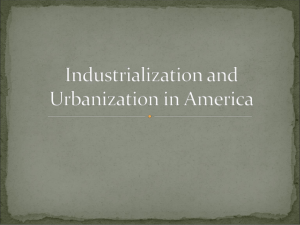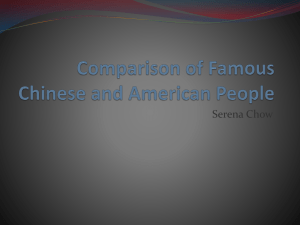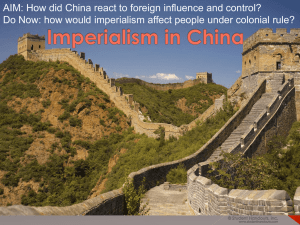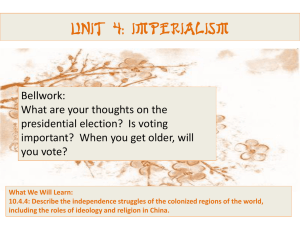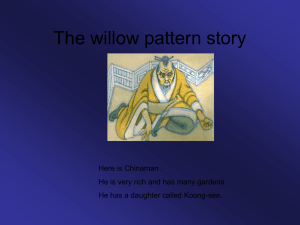Chinese Migration in the 18th Century
advertisement
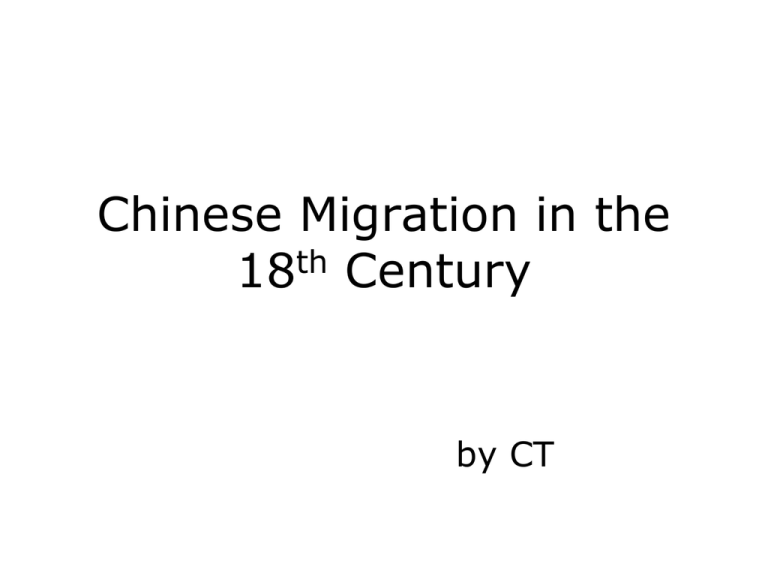
Chinese Migration in the 18th Century by CT Causes of Migration Immigrants are often discriminated against when they move to new societies and countries. GERMANS: • Good climate for planting oats IRISH: •Fled the great potato famine SCANDINAVIANS: •Cheap land CHINESE: •Social Reasons •Economical Reasons: - search of gold in California - railroad contributions This cartoon shows a little boy (Australia) and how - job openings they are afraid of the Chinese immigrants “flooding” their land http://www.multiculturalaustralia.edu.au/img/chinese_sea_cartoon.jpg Jobs the Chinese took • The Chinese mainly came in search of gold. • They sometimes used fake certificates to sneak into the US. http://www-tc.pbs.org/weta/thewest/resources/archives/images/wimg630/oc52mnrs.gif • They had various types of jobs: - miners - laborers - cooks - writers - artists - etc. •The increase in foreign immigration went up so fast, that "by the end of 1851, one of every ten immigrants was Chinese." (Littell 398-411) This picture shows Irish and Chinese workers on a railroad construction site. Railroad Contribution • Gold was not the only big opportunity for the Chinese. • Helped build the California Central Railroad. • The Chinese were thought to be too small and fragile to finish the job, but they managed to finish. • They started off really slow, but managed to quicken the pace. • Their starting pay was low. (about $28/ month) A group of Chinese workers working on the railroads. Mark Twain’s words "They are a harmless race when white men either let them alone or treat them no worse than dogs; in fact they are almost entirely harmless anyhow, for they seldom think of resenting the vilest insults or the cruelest injuries. They are quiet, peaceable, tractable, free from drunkenness, and they are as industrious as the day is long." (Twain) He tells about the way the Chinese act. They are very different from white folk, because they are not lazy but rather humble and peaceful when they do their work. However, people still call these immigrants lowly life humans and dogs. "A disorderly Chinaman is rare, and a lazy one does not exist. So long as a Chinaman has strength to use his hands he needs no support from anybody; white men often complain of want of work, but a Chinaman offers no such complaint; he always manages to find something to do." (Twain) This section goes into more detail about the Chinese. He says that there are no such things as a lazy Chinaman and disorderly ones are rare. A Chinese man could work for an outrageous amount of time and still not complain. Economic Downfall • The gold Rush ended in the 1900’s, but more immigrants kept on coming in. • This angered the Americans. • In order to restrain the Chinese immigration number to exceed, Congress passed the Chinese Exclusion Act. "SEC. 12. That no Chinese person shall be permitted to enter the United States by land without producing to the proper officer of customs the certificate in this act required of Chinese persons seeking to land from a vessel. And any Chinese person found unlawfully within the United States shall be caused to be removed therefrom to the country from whence he came, by direction of the United States, after being brought before some justice, judge, or commissioner of a court of the United States and found to be one not lawfully entitled to be or remain in the United States." (Congress) It says that no Chinese man can enter into the US unless they have the proper papers to do so. If they are found unlawful, they shall be removed immediately and returned back to where they were originally from. If after trial, they are still claimed unlawful, they will never be able to set foot on US land ever again. Summary •Immigrants are often discriminated against when they move to new societies and countries. •Americans were racist against the Chinese and did not allow more immigrants to migrate into America by using the Chinese Exclusion Act of 1923. •The Chinese were often persecuted in the 19th century, because Americans were afraid of immigrants overpowering their culture and their ways. •There are still immigrants being persecuted. Bibliography • Primary Sources: "Forty-Seventh Congress. Session I. 1882." Chinese Exclusion Act, 1882. Web. 1 Mar 2010. <http://www.mtholyoke.edu/acad/intrel/chinex.htm>. "The History of Chinese Immigration." The Brown Quarterly. 28 may 2000. California Department of Parks and Recreation Office of Historic Preservation, Web. 1 Mar 2010. <http://brownvboard.org/brwnqurt/03-4/034c.htm#wn>. Twain, Mark. "Library of Congress." Mark Twain's Observation About Chinese Immigrants in California. Web. 8 Mar 2010. <http://www.loc.gov/teachers/classroommaterials/presentationsandactivities/presentations/timeline/riseind/chinim ms/twain.html>. • Secondary Sources: "Anti-Chinese Movement and." The Bancroft Library. The Regents of the University of California, 31/1/2005. Web. 9 Apr 2010. <http://bancroft.berkeley.edu/collections/chineseinca/antichinese.html>. DOOLITTLE, HON. JOHN T. . "Chinese American Contribution to Transcontinental Railroad." Central Pacific Railroad Photographic History Museum . CPRR, 2010. Web. 31 Mar 2010. <http://cprr.org/Museum/Chinese.html>. Littell, McDougal. Creating America. Evanston, Illinois, Boston, Dallas: McDougal Littell, 398-411. Print. "The Journey to America." Immigration. ThinkQuest, n.d. Web. 31 Mar 2010. <http://library.thinkquest.org/20619/Chinese.html>. • Picture: http://sunsite.berkeley.edu/cgi-bin/flipomatic/cic/images@ViewImage?img=chs00000849_116a http://www.multiculturalaustralia.edu.au/img/chinese_sea_cartoon.jpg http://www-tc.pbs.org/weta/thewest/resources/archives/images/wimg630/oc52mnrs.gif

